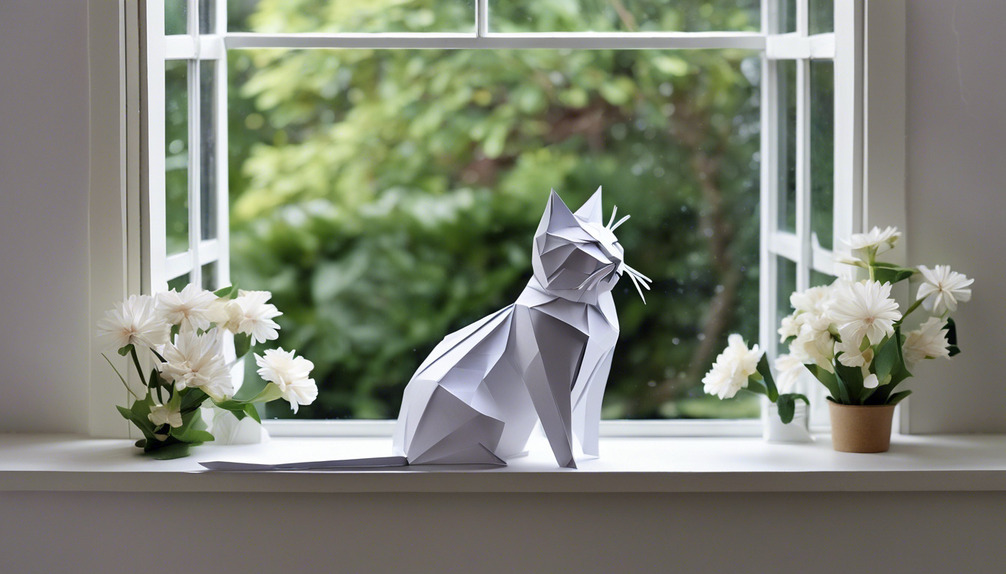As your senior cat enters the golden years, their nutritional needs can become as delicate as a house of cards. Balancing their calorie intake becomes crucial to ensure they stay healthy and happy.
With proper guidance, you can easily go through this process if you are patient and understanding.
So, let’s explore the five essential tips for balancing calorie intake in senior cats and provide the care and attention they deserve in their twilight years.
Key Takeaways
- Assess the senior cat’s caloric needs based on age and potential health risks and consult with a veterinarian to evaluate their senior or geriatric status.
- Choose a high-quality senior cat food with high protein content to support muscle mass and overall health, while considering individual health needs and avoiding excessive fillers or artificial additives.
- Limit treats and table scraps to prevent excessive calorie intake, opting for healthy, low-calorie options designed for senior cats and avoiding high-fat, high-sugar, or high-salt options. Consult with a veterinarian for guidance on treat portions and incorporate them into the daily calorie intake.
- Monitor the senior cat’s weight and body condition regularly, adjusting their diet as needed. For weight management and to address potential muscle mass loss, consult a veterinarian.
Assessing Senior Cat’s Caloric Needs
When assessing your senior cat’s caloric needs, it’s important to consider their age and any potential health risks they may face. Senior cats have specific nutritional requirements, as they may experience a decrease in energy requirements and difficulties in digesting certain nutrients. This can lead to weight loss or weight gain, and they may be more prone to becoming obese. Understanding their protein requirements is crucial, as it affects their overall health and muscle maintenance.
You must also take into account any underlying health issues that may impact their ability to absorb and utilize nutrients effectively. It’s essential to consult with a veterinarian to evaluate your cat’s senior or geriatric status before making any dietary changes.
Monitoring their caloric intake, implementing portion control, and choosing appropriate, nutrient-limiting diets are vital for maintaining their health and weight. Considering their specific health needs such as hydration and vitamin support is crucial for choosing the right senior cat food.
Your dedication to understanding and meeting your senior cat’s caloric needs is an important part of ensuring their well-being in their golden years.
Choosing the Right Senior Cat Food
Choosing the right senior cat food is an essential step in ensuring your beloved cat receives the specific nutrition needed to support their health in their senior years. When selecting senior cat food, consider the individual health needs of your senior cat.
Here are a few tips to help you choose the best food for your senior cat:
- Consult Your Vet: Your veterinarian can provide personalized dietary recommendations based on your senior cat’s specific requirements and health conditions.
- Read the Ingredient List: Ensure the food contains high-quality, nutritious ingredients, and avoid cat foods with excessive fillers or artificial additives.
- Choose High Protein Senior Cat Food: Look for senior cat food that’s high in protein to support your senior cat’s muscle mass and overall health.
As your loyal cat ages, their dietary requirements change, and providing them with the right senior cat food is a crucial aspect of their care. By selecting the appropriate senior cat food and considering their individual needs, you can help ensure that your senior cat enjoys their golden years with vitality and good health.
Managing Treats and Table Scraps
Transitioning from the focus on choosing the right senior cat food, it’s important to address the management of treats and table scraps to maintain your senior cat’s health and well-being. When it comes to managing treats and table scraps, it’s crucial to limit these indulgences to prevent excessive calorie intake in senior cats. Opt for healthy, low-calorie treats specifically designed for senior cats to avoid unwanted weight gain.
Be mindful of the table scraps you offer, avoiding those high in fat, sugar, or salt to maintain a balanced diet for your senior cat. Consulting with a veterinarian can provide valuable guidance on appropriate treat portions for your senior cat, ensuring that their overall diet remains in line with their specific needs. Treats should be used sparingly and can even be incorporated into your cat’s daily calorie intake to maintain a healthy balance.
| Managing Treats and Table Scraps | Facts |
|---|---|
| Limit treats and table scraps | Prevent excessive calorie intake |
| Choose healthy, low-calorie treats | Avoid weight gain |
| Avoid high-fat, high-sugar, or high-salt table scraps | Maintain a balanced diet |
Monitoring Senior Cat’s Weight
To effectively monitor your senior cat’s weight and ensure their overall well-being, regularly weighing them and performing body condition scoring are essential practices. This is important because older cats are more prone to weight changes and loss of muscle mass.
Here are some tips to help you monitor your senior cat’s weight:
- Regular Weigh-Ins: Weigh your senior cat regularly to keep track of any fluctuations in weight, which could indicate health issues.
- Body Condition Scoring: Learn how to perform a body condition score to assess your cat’s weight and adjust their diet accordingly. This will help you determine if your cat is underweight, overweight, or at an ideal weight.
- Consult a Veterinarian: Seek advice from a veterinarian on how to monitor and manage your senior cat’s weight. They can provide valuable insights and guidance tailored to your cat’s specific needs.
Monitoring your senior cat’s weight is crucial in maintaining their health and well-being. By staying proactive and observant, you can ensure that your cat stays at a healthy weight, which is essential for their overall quality of life.
Consulting With a Veterinarian
When considering your senior cat’s dietary needs, consulting with a veterinarian is essential to ensure their health and well-being as they age. As cats enter their senior life stages, their nutritional requirements change, and it’s crucial to seek professional guidance.
A veterinarian can provide tailored advice on senior cat diets, considering factors such as kidney disease, urinary problems, and the ability to digest nutrients effectively. They can recommend specific portion sizes and nutrient balance, taking into account your cat’s individual health and lifestyle.
If your cat has regular check-ups, the veterinarian can monitor their weight, overall health, and address any specific dietary concerns. Consulting with a veterinarian is particularly important if your cat has any health conditions, as they can provide guidance on suitable dietary options to manage or alleviate symptoms.
Frequently Asked Questions
How Many Calories Should Senior Cat Eat?
You should consult with your vet to determine the right calorie intake for your senior cat. They can assess your cat’s specific needs and recommend a balanced diet to support their health and well-being.
What Can I Give My Elderly Cat to Gain Weight?
To help your elderly cat gain weight, provide a high-quality, easily digestible diet and consult with a vet for tailored recommendations. Monitor their weight and adjust meal portions accordingly, ensuring they have access to water and consider canned food for increased hydration.
What Is the Suggested Feeding Guideline for a Senior Cat?
For a senior cat, the suggested feeding guideline is to consult with your veterinarian to determine their specific nutritional needs. Offer a variety of protein sources and gradually transition to a senior diet to maintain their health.
Do Cats Need More Calories as They Get Older?
As cats get older, their calorie needs may increase around 11 years old. It’s important to monitor their weight and consult a vet for portion recommendations. Dividing daily meals and choosing nutrient-rich diets can help manage their health.




